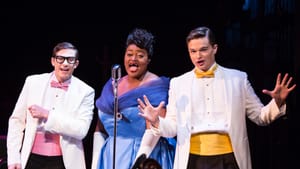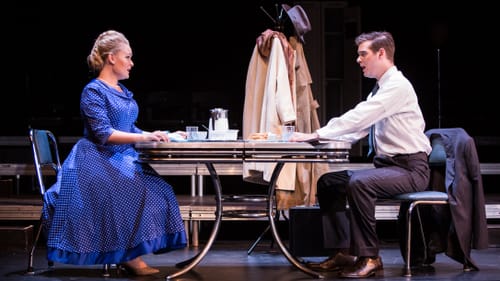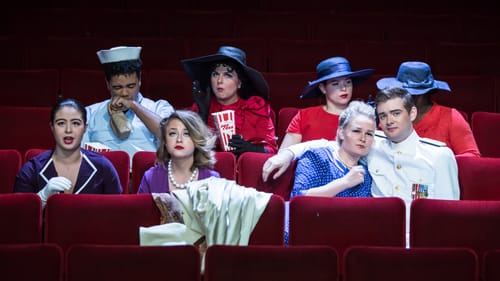Stay in the Loop
BSR publishes on a weekly schedule, with an email newsletter every Wednesday and Thursday morning. There’s no paywall, and subscribing is always free.
More trouble than paradise
Curtis Opera Theatre presents 'Trouble in Paradise'

Trouble in Paradise, Curtis Opera Theatre’s season opener, marries Leonard Bernstein’s Trouble in Tahiti with Henry Purcell’s Dido and Aeneas. On its face, little common ground exists between the 1955 jazz-infused chamber opera and the foundational work of Baroque music theater.
After viewing Chas Rader-Shieber’s puzzling production, I’m even more confused by the pairing.
The party's over
That Curtis would tackle Trouble in Tahiti makes sense. The conservatory gave the U.S. premiere of Garth Edwin Sunderland’s newly orchestrated A Quiet Place, its sort-of sequel, earlier this year. And we’re still technically in the throes of the Bernstein centennial — although, at this point, it feels like Lenny’s birthday party has occupied the better part of a decade.
Trouble in Tahiti has a checkered performance history and presents challenges that Curtis’s talented roster of musicians doesn’t entirely meet. Existing somewhere between musical theater and opera, it requires performers comfortable in the idiom of its period — the close harmonies of doo-wop and swing, the crooner pop songs you’d hear on a soda shop’s radio.
These elements especially come through in the music written for a “jazz trio” who narrate the piece, their pleasant, up-tempo harmonies pointedly mocking suburban conformity. Soprano Tiffany Townsend, tenor Colin Aikins, and baritone Dennis Chmelensky certainly look the part in a series of supper-club costumes — shawl-collared dinner jackets for the men and a sophisticated sapphire dress for the lady — but they can’t shed their operatic sound. Further, they tend to favor a more open-vowel, classical style of singing that obscures the sharp lyrics.
Playing it straight
The opera follows Sam and Dinah, whose claustrophobic, unhappy marriage serves as a metaphor for repressive midcentury conformism. It finds Bernstein at his most ponderous and self-important, and the couple are little more than archetypes. Still, a skilled director could do more to bring out the underlying anguish of the period through these performances.

Rader-Shieber largely leaves baritone Patrick Wilhelm and mezzo-soprano Siena Licht Miller hanging (Miller substituted for Anastasiia Sidorova at the performance I attended). Both performers play their roles relatively straight in places where subtext could flesh out the characters.
Wilhelm’s hypermasculine take on Sam ignores the character’s struggles with his identity as a husband, father, and provider. He bristles at Dinah’s devotion to psychoanalysis, but one should feel he would benefit from some time on the couch too. Instead, this Sam seems utterly convinced of his manly prowess.
Miller misses the most crucial element of the piece — the sustained aria that gives the work its title, an ode to a movie musical that Dinah passes her time with one afternoon. Although she initially scorns it as “drivel, nonsense, escapist Technicolor twaddle,” it becomes clear she longs to flee into the world of the film and forget her wifely responsibilities. Miller’s blunt, humorless performance misses the mark in communicating that hidden desire.
"Herding cats"
A jazz combo led by music director Lisa Keller serves Bernstein’s score well, although the snappy tempos bleed over inappropriately into Dido and Aeneas. Even more inappropriate, though, is Rader-Shrieber’s mise-en-scéne, which transports the Baroque work to a 1950s movie theater. This requires audience and artists to switch places, audience members taking seats onstage while the performers trickle into the Prince Theater auditorium.

Shifting the audience causes nothing but exasperation — the phrase “herding cats” crossed my mind multiple times — and the new setting adds nothing meaningful to Purcell’s tragic love story. If anything, it results in a deficit, as the majestic characters — queens, warriors, and witches — seem overwhelmingly ordinary.
I half expected the Sorceress (mezzo-soprano Emily Damasco, squally) and her coven (sopranos Olivia Smith and Lindsey Reynolds), dressed like middle-class housewives, to break into a verse of “Pick-a-Little, Talk-a-Little.”
Wilhelm looks dashing in a white Navy uniform, but the role of Aeneas sits a bit high for his firm baritone. Miller had the opposite problem; an underdeveloped lower range gives the impression of a short soprano rather than a true mezzo. A resourceful artist, she takes a fake-it-till-you-make-it approach to the music, although the Prince’s dry acoustics sometimes rendered her inaudible.
First-year soprano Ziyi Dai walks away with the production as Belinda, Dido’s devoted handmaid. Her light, pliable soprano has plenty of ping and a sweet, pleasant tone that serves the music well. “Pursue thy conquest, love,” Belinda’s challenging aria comes closest to approximating real Baroque style.
Miller offered a stylish reading of Dido’s Lament, though it was marred unforgivably by a directorial insertion of “The Man I Love,” vocalized by Dai, between the recitative and aria. Thankfully, Miller shrugged off this silliness, grounding her interpretation in a sense of stillness and peace in her decision to die by suicide.
The evening ended there, with Purcell’s final chorus excised. The purist in me scoffed, but as an audience member, I rejoiced at the chance to leave this alleged “paradise” in the dust.
What, When, Where
Trouble in Paradise. Leonard Bernstein, Trouble in Tahiti; Henry Purcell, Dido and Aeneas; Chas Rader-Shieber directed. Curtis Opera Theatre. October 4-7, 2018, at the Prince Theater, 1412 Chestnut Street, Philadelphia. (215) 893-7902 or curtis.edu.
Sign up for our newsletter
All of the week's new articles, all in one place. Sign up for the free weekly BSR newsletters, and don't miss a conversation.

 Cameron Kelsall
Cameron Kelsall